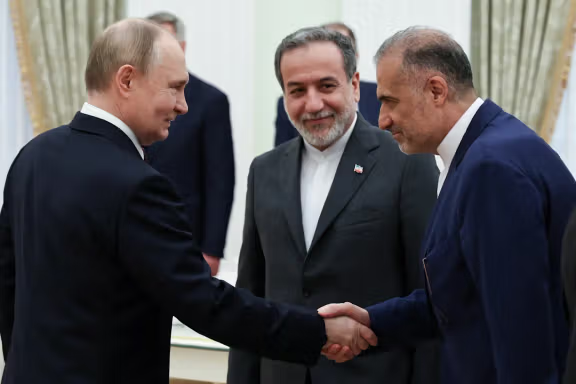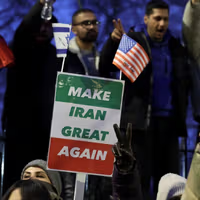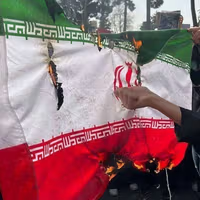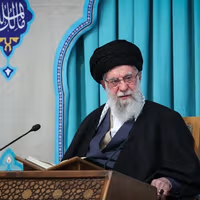The coalition of 27 reformist organizations, in a statement issued on Sunday, said “Iran’s social fabric was deeply wounded, with public life overshadowed by despair and anxiety.”
“The aftermath of the recent 12-day war with Israel, coupled with runaway inflation, industrial stagnation, the collapse of the national currency and capital flight, had created a more acute risk of economic paralysis than ever before.”
The statement urged the government to declare readiness for suspending enrichment and to accept full International Atomic Energy Agency (IAEA) monitoring in exchange for the lifting of sanctions.
Such a step, it said, could open the way for “comprehensive, direct negotiations with the United States and normalization of relations.”
It also called on all political forces committed to peaceful reform, inside and outside Iran, to unite around the national interest rather than what it described as “artificial and fruitless dividing lines.”
Reformist leaders echo warnings
Former president Hassan Rouhani and Green Movement leaders Mehdi Karroubi and Mir-Hossein Mousavi had already issued similar warnings.
Rouhani argued that easing tensions with the US was necessary and pressed for a new national strategy centered on development and Iran’s long-term strength.
“There is no way to save the country except for all of us to become servants of the people — to recognize that sovereignty belongs to the people,” moderate outlet Entekhab quoted Rouhani as saying on Thursday. “The Iranian nation owns Iran.”
“If we can improve relations with Europe, our neighbors, and both East and West—even reduce tensions with the United States—and it serves our interests, then why not?” he said. “Not only is there nothing wrong with it, it is our duty and obligation.”
Karroubi said that the ruling system’s policies, including the nuclear program, had driven the country to “the edge of the abyss” and urged a return to the people and structural reform.
'Snapback threat is real'
The Reform Front warned that European moves to trigger the UN’s snapback mechanism were credible and could restore Security Council sanctions, plunging Iran into an even deeper recession.
Foreign Minister Abbas Araghchi and Supreme National Security Council Secretary Ali Larijani both said last week that the Islamic Republic prefers the path of peace and is determined to block the Europeans' bid to reinstate the UN sanctions via the so-called snapback mechanism.
Britain, France and Germany told the UN on August 13 that unless Tehran returned to talks, they were prepared to invoke the measure by the end of the month.
An 11-point roadmap and hardline backlash
The reformist coalition outlined an 11-point roadmap for both domestic and foreign policy reforms. Chief among them were amnesty and pardons for political prisoners, lifting the house arrest of Green Movement Leaders Mir-Hossein Mousavi and Zahra Rahnavard, removing political restrictions on former president Mohammad Khatami, and ending the suppression of peaceful critics.
It further demanded restoring government authority by eliminating parallel institutions, returning the military to the barracks and curbing their economic and political role, and reducing the pervasive security lens applied to society.
On economic policy, the Reform Front demanded: “Taking the national economy out of the hands of ruling oligarchs, creating equal economic opportunities for all citizens, and providing a framework for both domestic and foreign investors.”
On foreign policy, the group advocated a pivot toward national reconciliation and regional cooperation, positioning reconciliation with neighbors as a basis for stability and sustainable peace.
Hardliner backlash
The statement provoked an angry backlash from hardline outlets. Kayhan daily, overseen by the Supreme Leader Ali Khamenei, accused the Reform Front of aligning itself with Western powers.
“The text, substance, and content of the Reform Front’s statements are aligned, identical, and consistent with the interests of the Western front — namely the governments of Europe, the United States, and Israel,” wrote Kayhan.
“The unfinished plan of Israel and the United States to eliminate the Islamic system continues with the assistance and efforts of the Western-oriented front and the leaders of sedition in Iran; in such a way that Israel’s failure to achieve its goals during the 12-day war is being compensated through the activities of those claiming to be reformists.”
The IRGC-affiliated Fars News Agency echoed those criticisms, labeling the document a “charter of submission to foreign enemies.”
“Evidence and analysis show that the content of the statement repeats demands that directly align with the long-term goals of the United States and the Zionist regime, and this alignment could be a sign of ideological or operational dependence,” Fars added.









